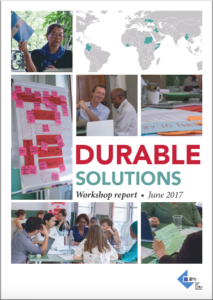 In June, we hosted a two-day workshop in Geneva on durable solutions analysis in internal displacement situations. We are excited to launch herewith the report consolidating key discussion points and outcomes, as well as the way forward for the project developing tools and guidance for measuring progress towards durable solutions.
In June, we hosted a two-day workshop in Geneva on durable solutions analysis in internal displacement situations. We are excited to launch herewith the report consolidating key discussion points and outcomes, as well as the way forward for the project developing tools and guidance for measuring progress towards durable solutions.
As Cecilia Jimenez-Damary, Special Rapporteur on the Human Rights of IDPs, stated in her opening remarks: “In the spirit of the IASC Framework, durable solutions analysis should be a collaborative process. Especially important is the ownership of government stakeholders in the process.” At JIPS we were therefore particularly thrilled to have officials from the Colombian, Somali, and Sudanese Governments participate in the workshop along with representatives of UN, NGOs, and academia.
Having had government partners alongside humanitarian and development actors directly contribute to the project in different pilot contexts is pivotal for ensuring relevance of the end products. Governments’ participation at both national and global levels has helped in developing tools that are useful to them in assuming their primary responsibility to provide durable solutions to IDPs within their jurisdiction in line with the IASC Framework on Durable Solutions criteria and principles.
So what can we learn from Colombia, Somalia and Sudan when it comes to assessing durable solutions to displacement? Ahmed Gangari (Director General of the National IDPs Centre at Humanitarian Aid Commission, Government of Sudan), Mohamed Moalim (Permanent Secretary at the Ministry for Humanitarian Affairs and Disaster Management, Federal Government of Somalia) and Oscar Rico Valencia (Advisor to the Deputy Director of the Victims’ Unit, Government of Colombia) shared their experiences in the workshop.
While the displacement situations in Colombia, Somalia, and Sudan are very different, the three officials agreed on several key elements of durable solutions analysis:

In many contexts lack of comprehensive durable solutions analysis is linked to a lack of available, reliable or comparable data. Still, simply having data on displacement situations isn’t enough: for the data to be effective and actionable one needs to take into account the planned use of it to have an analysis with a real impact.
Colombia has developed a framework called the ‘Indicators of the Effective Enjoyment of Rights’ (Indicadores de Goce Efectivo de Derechos in Spanish). JIPS has been supporting the analysis of the Colombian Government’s data on these indicators, to determine how progress varies based on district and region. This analysis can be used to identify key obstacles to reducing displacement-related vulnerabilities, and to directly target assistance to the most vulnerable individuals, communities or areas.
In Mogadishu, Somalia, a comparative durable solutions profiling exercise helped to identify the specific vulnerabilities that IDPs are facing, but also to highlight the need to address various development challenges in order to find durable solutions. As a result, internal displacement has now a stand-alone chapter in the National Development Plan. Work is currently on-going to develop a monitoring framework for this Plan, including disaggregating as many as possible of the over 60 Sustainable Development Goal (SDG) indicators that Somalia will be reporting on by displacement.
In Sudan, a pilot profiling exercise is currently being designed with the aim, among other things, to support comprehensive efforts to better plan for durable solutions for populations with differing situations in the country. In this context, understanding IDPs’ preferences for durable solutions, the obstacles they are facing to realise them, and opportunities for supporting progress towards reducing displacement-related vulnerabilities are key for outlining joint responses by the Government, humanitarian and development community. Durable solutions analysis will be directly linked to local level development plans and urban planning in cities hosting large numbers of internally displaced persons.

Based on the workshop outcomes, the durable solutions indicator library will be finalised, and JIPS will focus on developing guidance for its use for analysis. Stay tuned for the guidance and tools coming out of the project at the end of the year.